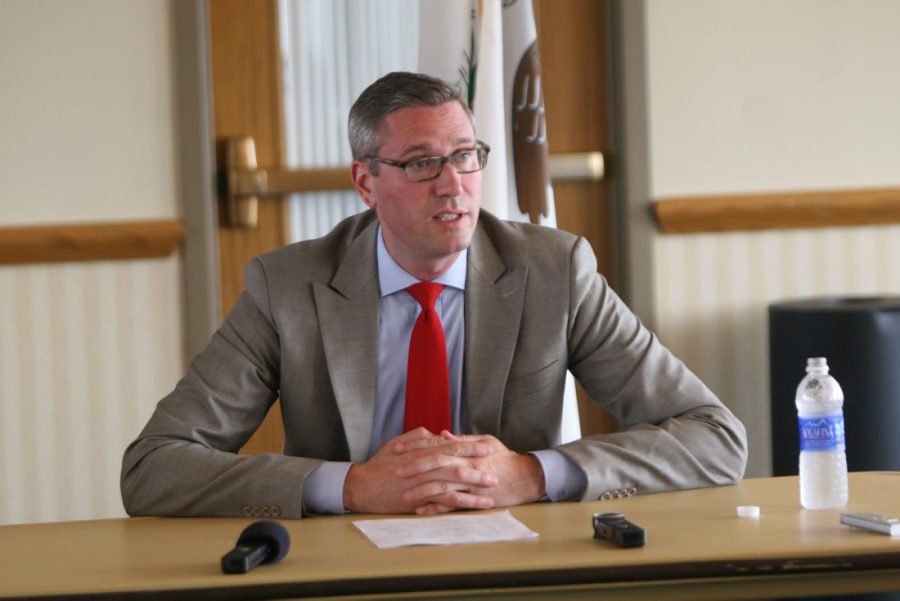Treasurer: MAP grant should be priority
Illinois Treasurer Mike Frerichs talks to a group of 16 NIU and DeKalb leaders Monday during a round table discussion in the Holmes Student Center Sky Room. Students are seven times more likely to go to college if they know they have the financial means to do so, said Frerichs, who visited NIU to express his support for MAP funding, among other things.
September 3, 2015
Ill. Treasurer Mike Frerichs said it is the responsibility of both Gov. Bruce Rauner and the General Assembly to step up and pass a budget so educational funding may be dispersed.
“The way our government is set up, no one has a monopoly. We don’t have a dictator,” Frerichs said. “Passing a budget should be the priority. We shouldn’t be putting other priorities before passing a budget and funding our education system.”
The treasurer hosted a roundtable discussion Monday at NIU with DeKalb and university leaders in attendance Monday, including Rep. Bob Pritchard (R-Hinckley), Kishwaukee College President Thomas Choice and DeKalb Mayor John Rey.
The main topic of discussion was the importance of MAP grants in aiding NIU students. MAP grants have not been dispersed due to a lack of an established state budget.
NIU, however, has credited more than 5,000 students with estimates of what they would receive in MAP grant assistance.
A lack of MAP grant funding also has an impact on community colleges like Kishwaukee. Kishwaukee College has more than 325 students qualifying for almost $212K in MAP grants this semester, Choice said.
“It’s difficult for those students and they’re taking it on faith, as we all are — that we’ll eventually get a budget and then eventually that money will be freed up,” Choice said. “We’re counting on that.”
Choice estimated that nearly 90 percent of Kishwaukee career program students stay in Illinois, and 75 percent of Kishwaukee students that go on to a university go to NIU.
Rainn Darring, Campus Activities Board president and MAP grant recipient, said not having MAP grants can effect his position on campus if CAB cannot provide big entertainment for few students. Darring said the uncertainty surrounding MAP grants also had him in the Financial Aid Office to seek alternative forms of aid as he expects to graduate in May.
“For the first time, seeing that balance, and for being such a student advocate for so long … it kind of hurts,” Darring said.
In the past decade or so, a divestment in education has occurred within the state, Frerichs said, which is causing more students to go to out-of-state schools.
“Well, I think [students and university officials] need to reach out to our government, our legislators, and make sure that they make higher education a priority,” Frerichs said.







